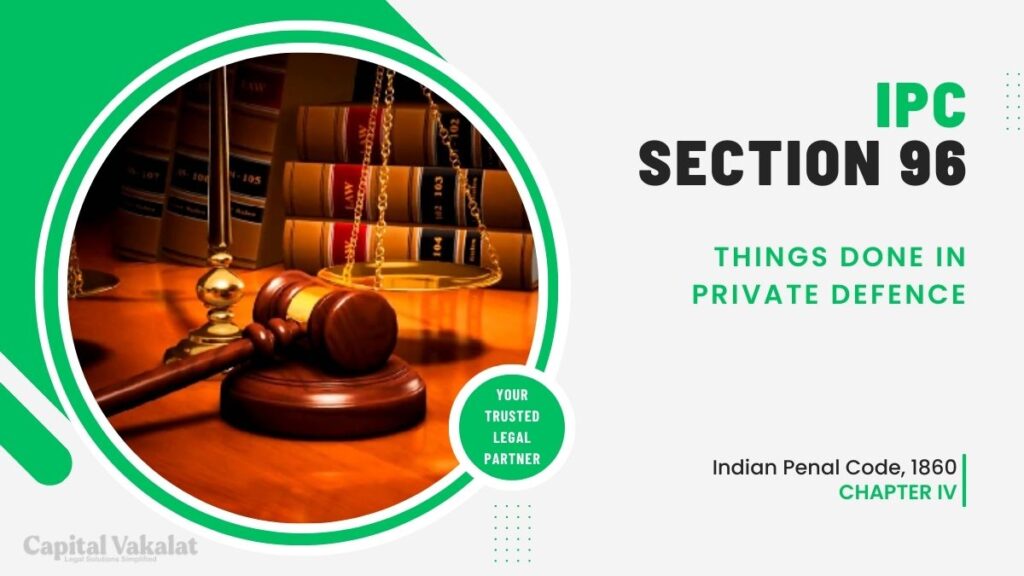In the realm of criminal law, Section 96 of the Indian Penal Code (IPC) holds paramount importance. It deals with a concept deeply rooted in the principles of self-preservation and safeguarding one’s own interests – private defence. This legal provision provides individuals with the right to protect themselves, their loved ones, and their property when faced with a threat.

In this article, we will delve into Section 96 IPC and explore the various aspects of actions taken in private defence.
Understanding Private Defence (Section 96 IPC)
Private defence, as stipulated in Section 96 of the IPC, allows individuals to use reasonable force to protect themselves and their property against unlawful aggression. It is crucial to note that this right is not absolute and comes with certain limitations and conditions. Let’s break down the key elements of Section 96 IPC:
1. Right to Protect
The fundamental premise of private defence is the inherent right of every person to protect themselves and their property from harm or damage.
2. Reasonable Force
Actions taken in private defence must be proportionate to the threat faced. Excessive force can lead to legal consequences.
3. Immediate Threat
Private defence is only justifiable when there is an imminent threat. Preemptive strikes are not protected under this provision.
4. No Retaliation
Private defence is not a license for retaliation. It is intended solely for protection against an ongoing threat.
The Scope of Private Defence
Now that we have outlined the basic principles of private defence under Section 96 IPC, let’s explore the scenarios where this provision can be invoked:
a. Protection of Person
Individuals can use reasonable force to defend themselves or others from physical harm. This includes actions taken to prevent bodily injury or even loss of life.
b. Defence of Property
Section 96 IPC also extends protection to one’s property. If someone is attempting to unlawfully enter your home or damage your belongings, you have the right to use reasonable force to prevent it.
c. Protection from Unlawful Detention
In cases where someone is unlawfully trying to detain you or restrict your freedom, you can resort to private defence to secure your release.
Legal Precedents and Case Studies
To better understand the application of Section 96 IPC, let’s look at a few real-world examples:
i. Case 1: Home Invasion
In a recent case, a homeowner used a cricket bat to fend off intruders who had broken into his residence. The court ruled in his favor, citing the right to private defence of property.
ii. Case 2: Assault Prevention
A woman, faced with an aggressive assailant, used pepper spray to protect herself. The court upheld her actions, emphasizing the right to personal protection.
Legal Constraints
It’s essential to comprehend that the right to private defence is not boundless. The law imposes certain constraints to prevent abuse:
A. Excessive Force
Using disproportionate force in private defence can lead to criminal charges. It is vital to assess the situation carefully and use only the force necessary to counter the threat.
B. Retribution
Private defence should never be confused with seeking revenge. It is purely a defensive measure and not a means to settle personal scores.
Conclusion
In conclusion, Section 96 IPC plays a pivotal role in safeguarding the rights of individuals to protect themselves, their loved ones, and their property. While it grants the right to private defence, it is crucial to exercise this right judiciously and within the bounds of the law. Understanding the principles and limitations of private defence is essential for every citizen.
FAQs
What is the difference between private defence and vigilantism?
Private defence is a legally recognized right to protect oneself or property from immediate threats. Vigilantism involves taking the law into one’s own hands, often without a direct threat, and can lead to legal consequences.
Is there a duty to retreat before resorting to private defence?
In some cases, there is a duty to retreat if it’s safe to do so. However, this requirement varies depending on the circumstances and local laws.
Can private defence be invoked in cases of mistaken identity?
If a person reasonably believes they are under threat, even if it later turns out to be a mistake, private defence may still be justifiable. However, the belief must be reasonable.
Can private defence be used against law enforcement officers?
Private defence can be invoked against anyone, including law enforcement, if the actions of the officer are unlawful and pose a threat to life or limb. However, it is a complex legal issue and should be handled with caution.